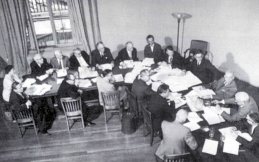Rachel Carson and the Awakening of Environmental Consciousness
Linda Lear, George Washington University
©Linda Lear ©National Humanities Center
|
|
(part 4 of 6)
GUIDING STUDENT DISCUSSION
Rachel Carson was so successful in changing our attitudes about nature and making us environmentally aware that your
students, like mine, may read parts of Silent Spring and wonder "what was all the fuss about? We know pesticides are
harmful and polluting is wrong." This response gives you the opportunity to establish the political and cultural context of
Carson's work. Ask them to speculate how hard it must have been for anyone, let alone a woman, to speak out. It also
gives rise to a discussion about the kind of an individual who takes on a cause against great odds, and the difficulties of
bringing about peaceful social change. Remind your students that in postwar America, science was god and science was
male. DDT and the pesticides that came to market were cheap and worked miracles for farmers who enjoyed prosperity
for the first time in decades. Chemical companies made millions of dollars and spent large sums advertising their
products as safe for home and farm. Some wildlife scientists had evidence during the war that DDT was killing certain
birds and fish, but you may ask you students to evaluate how big an impact such research would have on the operations of
a giant industry, and the farmer's desire for profits.
Carson was accused of being a communist and aiding America's enemies. McCarthyism and the social conformity it
produced were powerful obstacles to questioning the policies and actions of one's government. Students might be asked to
think about how hard it would be to convince people that their government did not know all the answers, or worse, had
hidden information. What advantages did Carson have?
|
Bates College  |
Carson tide-pooling c. 1956
|
"What role did gender play
in the controversy?"
|
|
 |
The gender attacks on Carson present you with another avenue of discussion. What role did gender play in the
controversy? Would it have been different if Silent Spring had been written by a man? Would his conclusions have had
more credibility with the American public? Would a male have been accused of being an alarmist, or hysterical? Carson
had no institutional affiliation and had never finished a Ph.D. in biology. Worse yet, she wrote for the public and not for
the scientific community. Ask you students to consider our criteria of expertise and what role independent writers have in
questioning authority. Was Carson a scare-monger? She was a woman who loved cats, and who loved the sea and the
beauty of the natural world. Her previous books read like poetry. How did these interests act against the public taking her
concerns seriously? How did she fight these stereotypes? I have found that reading the "Fable for Tomorrow" that opens
Silent Spring and is reprinted in Lost Woods: The Discovered Writing of Rachel Carson, Linda Lear, ed. (1998), provokes discussion not only about gender but about the value of apocalyptic writing as a tool of social reform.
E. Goldberg  |
Herbert Goldberg, Saturday Review, Nov. 10, 1962
|
|
|
 |
The first chemical that Carson mentions in Silent Spring is not DDT but the radioactive isotope Strontium 90. Throughout the book Carson draws upon the public's familiarity with deadly radioactive fallout and its similarities to DDT. Student might consider the nature of chemical pollution and how difficult it is to change attitudes about something we cannot see and which may only do harm generations later. What is our obligation to future generations in the care of the planet?
TeacherServe Home Page
National Humanities Center
7 Alexander Drive, P.O. Box 12256
Research Triangle Park, North Carolina 27709
Phone: (919) 549-0661 Fax: (919) 990-8535
Revised: June 2002
nationalhumanitiescenter.org |




